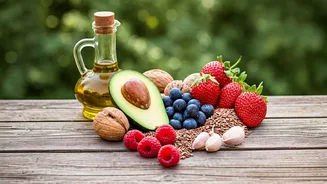Healthy Fats
Focusing on foods abundant in monounsaturated and polyunsaturated fats is a cornerstone for promoting healthy cholesterol levels. Foods like avocados,
olive oil, and various nuts are packed with these beneficial fats. Including a daily serving of these can significantly impact your HDL, the good cholesterol, which helps to remove LDL, or the bad cholesterol. Making these substitutions, such as using olive oil instead of butter, is a straightforward way to start. Choosing these fats over saturated and trans fats directly supports a heart-healthy lifestyle, contributing to better overall well-being. Regular intake is associated with not only increased HDL levels but also reduced risks of heart disease.
Fatty Fish Power
Fatty fish, such as salmon, mackerel, and sardines, are rich sources of omega-3 fatty acids, playing a vital role in heart health. These omega-3s are renowned for their ability to boost HDL cholesterol while lowering triglycerides, another type of fat in your blood. Aim for at least two servings of these fish weekly to capitalize on these benefits. Besides the cholesterol benefits, these fish also supply essential nutrients and proteins, contributing to a balanced diet. Incorporating these into your meals can be as simple as adding grilled salmon or a sardine salad, providing a delicious and nutritious option for your health.
Fiber-Rich Foods
Adding soluble fiber to your diet can make a considerable difference in managing cholesterol levels. Foods such as oats, apples, and beans are packed with soluble fiber, which helps reduce LDL cholesterol. This type of fiber works by binding with cholesterol in the digestive system, preventing its absorption. Consuming these fiber-rich foods regularly can lower the risk of heart disease. Starting your day with oatmeal or including beans in your meals is a simple yet effective strategy to boost your fiber intake. This not only supports cholesterol management but also promotes better digestive health, which is crucial for overall well-being.
Nuts and Seeds
Nuts and seeds offer a wealth of health benefits, including supporting healthy cholesterol levels. Almonds, walnuts, and flaxseeds are rich in healthy fats, fiber, and other nutrients that can boost HDL cholesterol. Regular consumption can reduce the risks associated with heart disease. A small handful of nuts or a tablespoon of seeds added to your meals can make a significant difference. Snacking on these items throughout the day provides a satisfying and nutritious boost. By making these simple dietary additions, you are investing in your long-term heart health. The variety available, from crunchy almonds to nutty flaxseeds, makes it easy to find options that suit your taste.
Olive Oil Magic
Olive oil is more than just a culinary staple; it's a heart-healthy powerhouse. Primarily composed of monounsaturated fats, it has been shown to improve HDL cholesterol levels and reduce LDL cholesterol. Replacing other cooking oils with olive oil can be a straightforward method to enhance your diet. Utilizing extra virgin olive oil for salad dressings or light cooking methods is ideal. Its versatility and health benefits make it a great addition. Consuming olive oil is connected to a lower risk of heart disease. The consistent use of olive oil as a key part of your diet provides an easy, tasty way to take care of your heart.
Soy-Based Foods
Soy products like tofu, edamame, and soy milk can influence your cholesterol profile positively. These foods are a good source of protein, and some studies suggest they may increase HDL cholesterol while lowering LDL cholesterol. They can be easily integrated into various meals, offering flexibility in your diet. Including soy in your diet is simple, from adding tofu to stir-fries to enjoying a soy latte. The dietary changes associated with these ingredients provide a plant-based strategy to improve heart health. Regular intake of soy-based foods not only provides essential nutrients but also supports cholesterol management, contributing to a holistic wellness approach.
Dark Chocolate
Dark chocolate, in moderation, offers surprising benefits for heart health. This treat contains antioxidants and flavonoids, which have been linked to an increase in HDL cholesterol. Choosing dark chocolate with at least 70% cocoa can maximize these health benefits. Enjoying a small portion as a daily treat can be a delicious way to support your heart. However, it's important to consume it mindfully due to its calorie content. Regular consumption, coupled with a balanced diet, can contribute positively to your cardiovascular health. Enjoying a piece of dark chocolate can be a guilt-free pleasure, knowing it offers both enjoyment and potential health perks.















